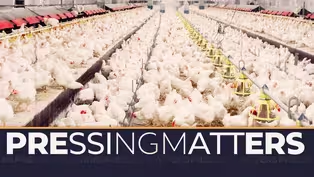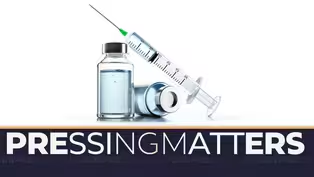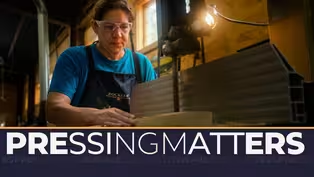Pressing Matters
Pressing Matters | Public Media Funding
Clip: Season 2 Episode 3 | 4m 48sVideo has Closed Captions
Public Media Funding
On July 18, H.R. 4, the Rescissions Act of 2025 passed both chambers and is expected to be signed by President Trump. The Bill rescinds about $1.1 billion dollars from the Corporation for Public Broadcasting, which funds NPR and PBS. WCMU General Manager Rick Westover explains how impactful and imperative funding is for Public Media.
Problems playing video? | Closed Captioning Feedback
Problems playing video? | Closed Captioning Feedback
Pressing Matters is a local public television program presented by WCMU
Pressing Matters
Pressing Matters | Public Media Funding
Clip: Season 2 Episode 3 | 4m 48sVideo has Closed Captions
On July 18, H.R. 4, the Rescissions Act of 2025 passed both chambers and is expected to be signed by President Trump. The Bill rescinds about $1.1 billion dollars from the Corporation for Public Broadcasting, which funds NPR and PBS. WCMU General Manager Rick Westover explains how impactful and imperative funding is for Public Media.
Problems playing video? | Closed Captioning Feedback
How to Watch Pressing Matters
Pressing Matters is available to stream on pbs.org and the free PBS App, available on iPhone, Apple TV, Android TV, Android smartphones, Amazon Fire TV, Amazon Fire Tablet, Roku, Samsung Smart TV, and Vizio.
Providing Support for PBS.org
Learn Moreabout PBS online sponsorship- Well, WCMU, our focus is bringing you the news, but over the past few months, we found ourselves being in the news.
Many of you have heard our updates in response to the proposed federal funding cuts.
Not only does the Trump Administration's proposed fiscal year 2026 federal budget not include funding for public media, but the White House is also looking to rescind, take back funding that's already been approved.
This is a fluid situation.
The story is literally changing by the day and the week.
And for the latest developments here to speak with us is our general manager, Rick Westover.
Rick, thanks for being here.
- You're welcome.
It's good to be here.
Maybe not on these circumstances, but glad to speak with you, yeah.
- The total funding that we do get from the federal government, it's really small.
It's, I believe, 0.01% - Of the entire federal budget, yeah.
- Of the entire federal budget.
But we do, we leverage every single dollar of that.
So why is this funding so crucial?
- It's so crucial because in many ways it's seed money giving us the ability to do the work that we need to do and then encourage our audience to step forward and offer support.
And honestly, it's our audience that gives the largest share of the funding that we have to operate.
But without that 1.6 million that we receive as our share of this corporation for Public Broadcasting Funding, you know, we'll be limited.
We'll be forced to make some difficult decisions.
Maybe we need to limit some of the programs that we air.
Maybe we have to make difficult decisions about our staffing.
And that's something that I do not want to touch.
That's not why I got in this business.
We want to, you know, have these resources available to serve our communities as best as we can.
But then there are other pieces to this too.
We air music on WCMU, for example, and the Corporation for Public Broadcasting actually covers the fees necessary to air music.
Now, if the Corporation for Public Broadcasting Funding goes away, now that bill comes to us, we don't even know the extent to which that will be.
So, you know, not only have we lost funding, but then there are added costs now.
And it, you know, could limit our ability to provide the lifesaving emergency alerting that we need to provide to our communities.
In many cases, we may be the only locally-owned operated media in their community.
They may not have broadband to access us any other way, but with an aerial antenna of some kind.
There are folks that could lose out on media of any kind across the country in these pockets of rural, tribal communities, and so on.
We know there are stations in the state where their share of federal funding is more like 40%.
That could be devastating to them to lose that funding.
So it's the importance of, you know, the freedom of the press and just the ability to step forward and be a resource for our communities.
When with this funding, you said to yourself, 0.01% of the federal budget connects with, reaches, impacts 99% of America.
It is such a success story, the Corporation for Public Broadcasting Act and we're hopeful to see that continue unharmed, and our viewers and our listeners can have an impact by going to www.ProtectMyPublicMedia.org, where they'll provide information on how you can get involved and help the process.
- Thank you, Rick.
And again, to recap the funding that we receive from the federal government alongside the incredibly generous support of our viewers is absolutely critical to the mission that we serve here at WCMU Public Media.
It ensures that we continue to give you access to those essential educational, local, and cultural programming, and it provides trustworthy in-depth news, and emergency community-based services like those weather alerts across WCMU Radio and WCMU TV.
Without this funding, some public media stations may not survive.
Pressing Matters | Childhood Vaccines
Video has Closed Captions
Clip: S2 Ep3 | 7m 4s | Childhood Vaccines (7m 4s)
Pressing Matters | Marine Trades Institute
Video has Closed Captions
Clip: S2 Ep3 | 4m 31s | Marine Trades Institute (4m 31s)
Providing Support for PBS.org
Learn Moreabout PBS online sponsorship
- News and Public Affairs

Top journalists deliver compelling original analysis of the hour's headlines.

- News and Public Affairs

FRONTLINE is investigative journalism that questions, explains and changes our world.












Support for PBS provided by:
Pressing Matters is a local public television program presented by WCMU


